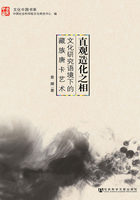
Abstract
In the context of contemporary cultural studies, this book is an in - depth theoretical study and artistic exploration of Thangka, the integrated symbol of Tibetan culture, religion and art, namely. The stady focuses on several important topics, such as the Tibetan philosophy of life, the spirit of Tibetan art, the contemporary visual culture, etc. Based on the new cross -disciplinary perspective(philosophy, cultural studies, literary theory, anthropology, etc.), the study goes into some areas ignored in previous studies. This book pays close attention to the Tibetan spirit, aesthetic characteristics and artistic features embodied in Thangka. It reveals the ferocious beauty uniquely represented by Thangka. From the point of view of the overlapping effects of cultural psychology, religiosity and worldliness, the book tries to find the underlying meanings of Thangka as the historical inheritance and the ethnic cultural symbol. chapter one is devoted to examining the five characteristics of Tibetan philosophy of life and the characteristics of the“view”visual culture of Thangka. The results of the study have found practical applications, ineluoling a reflection on Thangka as an intangible cultural heritage and its commodification/commercialigation and further theoretical analyses on several related issues.